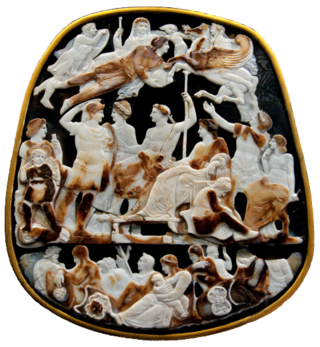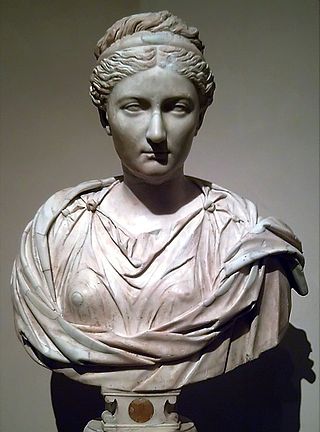Related Research Articles

The Julio-Claudian dynasty comprised the first five Roman emperors: Augustus, Tiberius, Caligula, Claudius, and Nero.

Lucius Aelius Caesar was the father of Emperor Lucius Verus. In 136, he was adopted by the reigning emperor Hadrian and named heir to the throne. He died before Hadrian and thus never became emperor. After Lucius' death, he was replaced by Antoninus Pius, who succeeded Hadrian the same year.

Salonia Matidia was the daughter and only child of Ulpia Marciana and wealthy praetor Gaius Salonius Matidius Patruinus. Her maternal uncle was the Roman emperor Trajan. Trajan had no children and treated her like his daughter. Her father died in 78 and Matidia went with her mother to live with Trajan and his wife, Pompeia Plotina.
Marcus Annius Verus was the paternal grandfather and adoptive father of the Roman Emperor Marcus Aurelius, and father-in-law of emperor Antoninus Pius.
Marcus Annius Libo was a Roman Senator active in the early second century AD.
Libo Rupilius Frugi was a Roman senator and an ancestor of the emperor Marcus Aurelius. He served as suffect consul in 88.
Lucius Aelius Lamia Plautius Aelianus was a Roman senator.
Gaius Avidius Nigrinus was a Roman senator who lived between the 1st and 2nd centuries. Nigrinus served as suffect consul for the nundinium of April to June 110 with Tiberius Julius Aquila Polemaeanus as his colleague.

The gens Annia was a plebeian family at ancient Rome. Livy mentions a Lucius Annius, praetor of the Roman colony of Setia, in 340 BC, and other Annii are mentioned at Rome during this period. Members of this gens held various positions of authority from the time of the Second Punic War, and Titus Annius Luscus attained the consulship in 153 BC. In the second century AD, the Annii gained the Empire itself; Marcus Aurelius was descended from this family.
Ceionia Fabia was a noble Roman woman and a member of the ruling Nerva–Antonine dynasty of the Roman Empire.
Marcus Peducaeus Plautius Quintillus was a Roman noble closely related by birth, adoption, and marriage to the Nerva-Antonine emperors. Through his marriage to Fadilla, the daughter of Emperor Marcus Aurelius and Empress Faustina the Younger, he became the brother-in-law to the future emperor, Commodus. Despite his position, he never became emperor himself. After Commodus was assassinated in 192, he fell out of favor with Septimius Severus during the Year of the Five Emperors. In 205, he killed himself after Septimus issued an order for his execution.

Vibia Aurelia Sabina was the youngest daughter and child born to Roman Emperor Marcus Aurelius and Roman Empress Faustina the Younger. She was a sister to Roman Empress Lucilla and Roman Emperor Commodus. Her maternal grandparents were Roman Emperor Antoninus Pius and Roman Empress Faustina the Elder and her paternal grandparents were Domitia Lucilla and praetor Marcus Annius Verus.
Annia Fundania Faustina was a noble Roman woman who lived in the Roman Empire during the 2nd century AD. She was the paternal cousin of Roman Emperor Marcus Aurelius and his sister Annia Cornificia Faustina.
Marcus Ummidius Quadratus Annianus (138–182) was a Roman Senator and the nephew of the Emperor Marcus Aurelius. He was involved in an unsuccessful plot to assassinate his cousin the Emperor Commodus, which led to his execution afterwards.
Sulpicia Praetextata was an ancient Roman noblewoman who lived in the Roman Empire in the 1st century.

The gens Fundania was a plebeian family at Ancient Rome, which first appears in history in the second half of the third century BC. Although members of this gens occur well into imperial times, and Gaius Fundanius Fundulus obtained the consulship in BC 243, the Fundanii were never amongst the more important families of the Roman state.
Sextus Vettulenus Civica Cerialis was a Roman senator of the early second century. He was ordinary consul in AD 106 as the colleague of Lucius Ceionius Commodus. No further details of his career are attested.
Gaius Ummidius Quadratus Sertorius Severus was a Roman senator active during the second century AD. He was suffect consul in absentia for the nundinium of May to June 118 as the colleague of the emperor Hadrian. He is more frequently known by his shorter name, Gaius Ummidius Quadratus; his full name was known only after a missing piece to an inscription from Tomis was found.
Plautia was a Roman woman of senatorial rank whom Classical scholars believe lived in the late first century and early second century AD. No direct evidence of her existence has yet been found. Ronald Syme comments about her situation, "Plautia exemplifies a common phenomenon in the history of Imperial Rome; a fragment of knowledge rescued from the waters of oblivion, but a figure of consequence in the social and political history of the time."
Marcus Annius Libo was a Roman senator. He was suffect consul in the nundinium of January-April 161 with Quintus Camurius Numisius Junior as his colleague. Libo was the nephew of emperor Antoninus Pius, and cousin to emperor Marcus Aurelius.
References
- ↑ Ronald Syme, "Antonine Relatives: Ceionii and Vettulani", Athenaeum 35 (1957), p. 309
- ↑ Acta Instituti Romani Finlandiae. Bardi. 1963. p. 55. ISBN 9789514102608.
- ↑ Aelii Lamiae, stema
- ↑ Birley, Anthony R (2012). Marcus Aurelius: A Biography (reworked ed.). Routledge. ISBN 9781134695690.
- ↑ Syme, "Antonine Relatives", pp. 306-315
- ↑ Werner Eck, "Jahres- und Provinzialfasten der senatorischen Statthalter von 69/70 bis 138/139", Chiron , 13 (1983), p. 172
- ↑ Anthony Birley, Marcus Aurelius, a Biography, revised edition (London: Routledge, 1987), p. 32